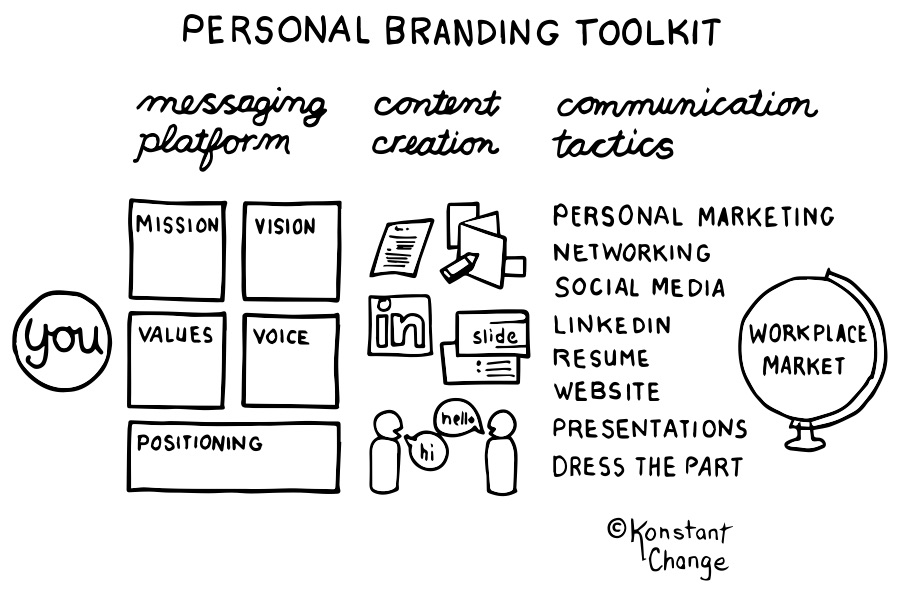
Why Build a Personal Brand?
This article focuses on why personal branding. The next question, “How can I build a brand?” will be covered in a future article.
Simon Sinek suggests we start with why before we build out an idea or launch a business. His research found that humans don’t buy into anything until they understand the why behind it.

The value of personal branding is increasing as the workplace integrates higher levels of automation and responds to persistent change.
Employees and entrepreneurs are more and more valued and recognized for the quality of attributes like creativity, problem solving abilities, and interpersonal skills. Individuals must become known for their unique attributes and soft skills in addition to their occupational expertise through effective packaging and communication.
Personal branding is not going to fade away.
You might wonder why we are still building a case for the personal brand. The answer is simple.
While there are no readily available statistics, most people are still not investing in this important aspect of career management. Many workers don’t even use a decent personal photo on their LinkedIn profile.
While the workplace serves as the pace car for change, workers will need to step up the pace and quality of their efforts to sustain their career relevance and competitive edge.
“Be so good they can’t ignore you.” –Steve Martin

Five Personal Brand Masters Explain Why
Tom Peters who specializes in business management topics like those covered in his book In Search of Excellence, launched the personal branding trend over 20 years ago in 1997.
At a time when the internet was making its famous ascent, the Fast Company article, The Brand Called You, admonished workers to control their future by owning their brand.
“We are CEOs of our own companies: Me Inc.” –Tom Peters
He strongly advocated for personal self-promotion for the purpose of standing out. Tom’s idea is to create enough personal value to earn and maintain being a free agent in a world of free agency.
Dan Schawbel, founder of Millennial Branding and author of Promote Yourself and Me 2.0, focused on the branding needs of his generation, the millennials.
Through his personal branding blog, extensive related businesses, focus on workplace trends, and rigorous research, he elevated the practice of branding as a must have requirement in the workplace.
“Brand yourself for the career you want, not the job you have.” –Dan Schawbel
“If you don’t take ownership of your online reputation, your Google results will speak for themselves.” –Dan Schawbel
Dorie Clark, marketing consultant and keynote speaker, wrote a trilogy of books focusing on business professionals and online entrepreneurs who want to stand out in a noisy, crowded business environment. Her books include: Reinventing You: Define Your Brand, Stand Out, and Entrepreneurial You.
Her premise is if you are an entrepreneur, standing out and attracting employers and customers will result in long-term repeatable income.
“In today’s competitive economy, it’s not enough to simply do your job well. Developing a reputation as an expert in your field attracts people who want to hire you, do business with you and your company, and spread your ideas. It’s the ultimate form of career insurance.” –Dorie Clark
Mark Schaefer a marketing strategist and author of Known: The Handbook for Building and Unleashing Your Personal Brand, highlights a core impediment to growth. The biggest problem people have in growing their business, getting a job, or advancing in their careers is no one is aware of their work or who they are.
He cites his own experience of being recognized in his industry at the top of his game as an international marketer with a Fortune 500 company. When he left his job to start a marketing consultancy, he found himself trying to market his services in a world of buyers who did not know him or his reputation.
He solved the problem by becoming his best case study through his four-step brand-building process.
“Being known is really the only sustainable competitive advantage a person can have today.” –Mark Schaefer
Mark became known to attract business from some of the top clients across the globe. Becoming known in the digital world is Mark’s magic.
Denise Brosseau founder of Thought Leadership Lab, and author of Ready to Be a Thought Leader? How to Increase Your Influence, Impact, and Success, demonstrates how to become the go-to person in a particular niche.
Thought leader status enables individuals to obtain opportunities like speaking, consulting, or a new job. She believes being a thought leader is a critical step in building your brand.
“Becoming a thought leader provides you with “career insurance” because people like to hire and promote well-known and accomplished change agents.” –Denise Brosseau
Remember, You are Selling. They are Buying.
The survival of a business requires customers. The agreement is simple: money in exchange for a product or service. The same holds true for people and careers.
Many job seekers fail to package themselves to attract employers, an act that demonstrates personal value and establishes a human connection.
Don’t forget, you are selling. Employers are buying your services in the market exchange of work.
What are you better at than anyone else? What sets you apart? This is your golden elevator pitch.
You are an integrated product and services package, available for hire in your chosen role and industry. You are the product manager of your own brand, responsible for design, development, pricing, and marketing.
Everyone in the workforce is in sales, whether or not you claim to be.
For example, if you need approval for a department budget, you are in the business of selling and pitching your ideas. When you are competing for a job, you are selling the employer on why you are the best person for the role.
Admit it, you are in sales! And every sale starts with a strong brand.
Learn From the Big Brands
The most visible and attractive brands in the world, like Nike, Apple, Disney, and Google create a human connection with their customers.
As consumers, we feel better about ourselves by affiliating with these brands – demonstrating the power of strategic branding. In turn, these massive brands can teach us something about career management.
Consider the question, “If a tree falls in the forest and no one is around to hear it, does it make a sound?”

Being visible, having a voice, and a clear message are essential brand elements. Your voice needs to be heard in the world of work. You must get out of the forest and develop your message.
In branding terms, if you are different from the rest, and visible, you are memorable. When the time comes for employers, partners, and clients to choose someone with your unique and notable qualities, you will rise to the top. You will be chosen above all others.
This is why personal branding, or career branding, is one of the central principles of career agility. The optimization of your personal brand requires consistent reflection and vigilant attention.
The Agile Career Personal Brand Principle
Uncover your distinguishing characteristics or brand values. Package your portfolio of skills and be consistent in how you communicate and present yourself to the human workplace. When making a decision, pose the question, “Is this in alignment with my brand values?” Spread the story-driven message in real life and across your digital networks. Be bold and dare to be different.
Don’t Forget About Trust as a Vital Brand Element
The famous salesman, author, and motivational speaker Zig Ziglar once said,
“If people like you, they will listen to you. If they trust you, they will do business with you.” –Zig Ziglar
Join a community of Agile Careerists and learn how to create your own personal brand – subscribe to Marti’s 52 Ideas. For more details on career agility, check it out here. To learn from others who have realized the benefits of an agile career, including real stories and perspectives, read Activate Your Agile Career.
